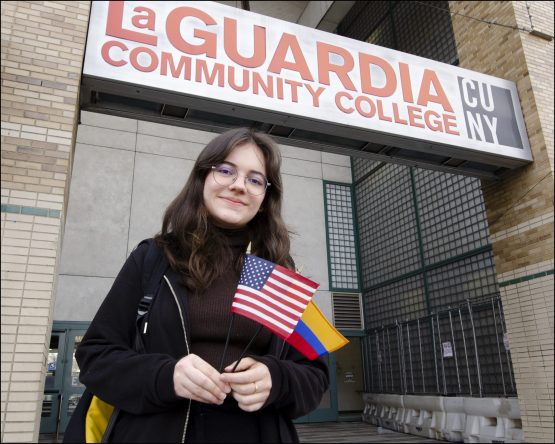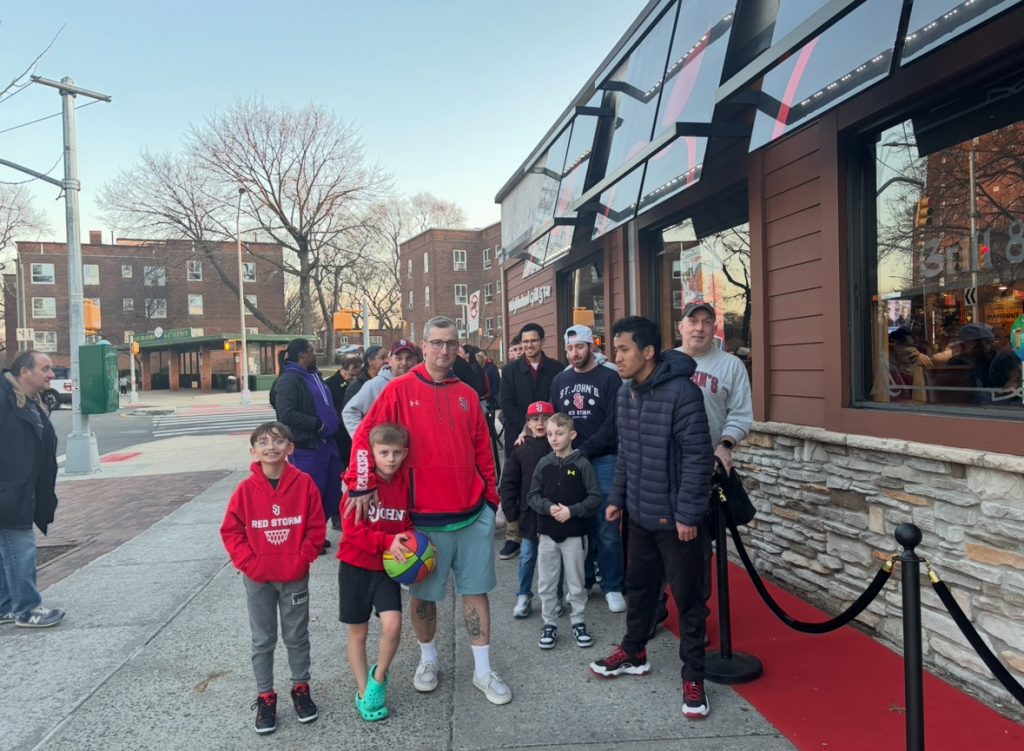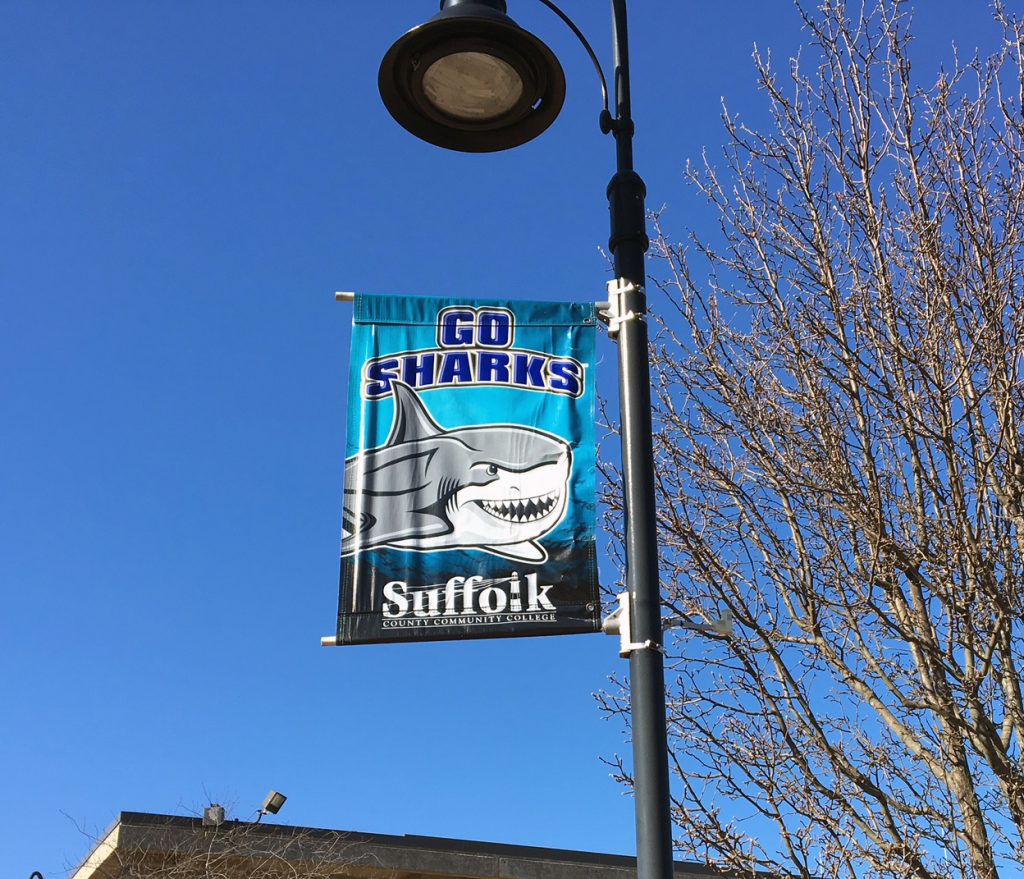By Dave Paone
Campus News
For the past few years, a hot-button issue in the US has been immigration – specifically illegal immigration – and with 2024 being a presidential election year, the issue is key for a majority of the electorate.
Campus News met Juanita Herrera, an 18-year-old freshman at LaGuardia Community College, who arrived in the US from Colombia, South America, with her family a year ago.
She, her parents and her brother have immigrated legally, and are attempting to live out the American Dream. Juanita told Campus News of their journey to citizenship.
Beginnings
In Colombia, Juanita’s father was an economist and her mother was an accountant, both with college degrees.
Just as the US has three social classes (upper, middle and lower), Colombia has the same but with six levels within those three classes.
Numbers one and two are lower, numbers three and four are middle and numbers five and six are upper. Juanita’s family was a four, making them solidly middle class.
It was during time her parents spent working in the US that her older brother was born in 2000. They soon returned to Bogotá, the country’s capital.
Stereotypes
For many Americans, everything they know about Colombia they know from the movies. Therefore they think the only industries in the country are cocaine and coffee.
“In other years, it was very common to see cartels in different parts of Colombia, but now this is not like that. It’s not like in the movies,” Juanita told Campus News.
She added that the drug trade still exists, but there are no longer kingpins such as Pablo Escobar.
“We’re not proud of that being part of our history,” she said.
As for coffee, “I think it’s one of the main products we export,” she said. But just as the cobbler’s children go shoeless, many Colombians wind up drinking instant coffee.
“We end up not caring that much about the good coffee that we export and then the other countries are the ones enjoying it the most,” she said.
Making the Move
Juanita’s parents first mentioned relocating to the US only a year before they left. “It was kind of fast,” she said.
Just as immigrants to the US have done for centuries, Juanita’s parents made the move for better opportunities the country offers.
“I love Colombia. It’s a pretty country – it’s a beautiful country, beautiful people – but it may be really hard to find opportunities there,” she said. “Sometimes you can have your degree and everything, and study in a good college, but when you graduate it’s hard to find a job.”
When her brother graduated high school at 17 years old, he moved to the US on his own. Since he was born here, that makes him a US citizen.
As a US citizen with a residency in the country, this made it easier for the family to join him. However, Juanita said there was still “a whole process” that took about two years.
Additionally, Juanita is here on a student visa and she needs to be enrolled in college full-time to keep it current.
As with any governmental department, there’s endless bureaucracy and forms to fill out. An immigration lawyer is not cheap so her parents applied on their own.
After an eight-month wait for a response, they were told there was a missing form, which delayed the process for another eight months.
Her parents need to be residents for five years before they can apply for citizenship. “And then for me it would be a little longer,” she said.
“Starting From Zero”
Juanita’s parents used to be full-time employees at companies but after she was born, her mother went freelance and worked from home, to better care for their children. Her father did the same a few years later.
Then the pandemic reduced their number of clients.
Once they moved to the US, using their college-learned skills was impossible to parlay into jobs similar to the ones they had in Colombia.
Her mother couldn’t immediately start working as an accountant because Colombian tax laws are different from here and she’ll need to take additional courses to get up to speed.
They came with no jobs lined up and it took about three months to land one as a dishwasher on the night shift in a restaurant (him) and a manager at a laundry (her).
Her parents’ English wasn’t as good as hers and they needed to work on it.
Juanita feels her family was “starting from zero” once they landed in the US.
Culture Shocks
Just as many Americans know what they know about other countries strictly by what they see in the movies and television, much of what Juanita knew about the US she knew from entertainment as well. It was music and movies; she didn’t watch American television. (She had never heard of “Law & Order.”)
She said, “the way people interact with each other,” particularly on public transportation, was “shocking.”
“In the train, you cannot stare at someone because that person is going to think that you have something against them and they will get mad about it,” she said with a laugh.
And New York City was dirtier and noisier than what she saw in the movies.
She noticed everyone is “so independent” and are “centered in their jobs and their lives” and no one is all that friendly, compared to Colombia, where “you can talk to anyone, even in the street.”
“When you go to buy something, you end up being friends with the person that works there,” she said.
(Campus News let her know this is a New York thing; other parts of the country are very friendly to strangers.)
English
Juanita’s English is excellent. Colombian schools start teaching it in middle school but that’s not where she got good at it.
“I would say it’s not the same. You learn theory but you don’t use it,” she said, noting that Colombia has few immigrants and everyone speaks Spanish.
It was in the past year in the US she honed her English language skills. Part of that was by watching movies and listening to music in English. She learned that hack from her brother.
“As a younger sister I always copied what he did,” she said with another laugh.
“It’s not until you get to use it – like every day in every conversation – that you have the need to improve your English,” she said.
LaGuardia
Having landed in Queens, Juanita attends LaGuardia Community College where she’s a music recording technology major. She also plays the bass guitar (and knows who Paul McCartney is) plus some keyboards and other instruments.
When Campus News met her in early March she had taken all of one class the week before.
“I’m excited about starting this new path of college,” she said at the time.
Her brother is a LaGuardia graduate with a major in industrial design and has since transferred to City College of New York. Juanita plans to transfer to another college once she’s finished at LaGuardia, possibly eventually earning a master’s, but that will be dictated by what’s required to work in the industry.
The Land of Opportunity
From a young age Juanita heard her fellow countrymen talk of how the US is the land of opportunity. (They don’t call it “America,” since there’s North America, Central America and South America.)
“We’re raised with that ideal,” she said. “We think that everything’s amazing here.”
And since Juanita is pursuing a career in the arts, she feels the US is good for that, too. “This is a country where it’s easier to be an artist,” she said.
While Juanita had to leave all her friends and her entire life in Colombia behind, she has no regrets.
“I think it was a good decision,” she said. “Moving to the US has been challenging for my whole family, but it’s getting better every time.”







Facebook Comments